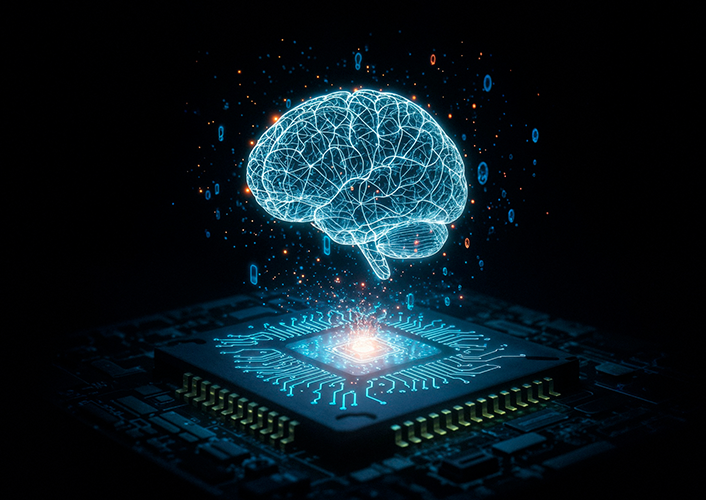In today’s industrial landscape, the shift to AI-powered Machine Learning Services is already underway, streamlining operations and unlocking new levels of process efficiency.
Machine Learning Services have emerged as indispensable software solutions across every sector, enabling organizations to anticipate production errors and customize healthcare offerings to maintain a competitive edge both locally and globally.
Technology leaders – from Chief Technology Officers (CTOs) and Chief Information Officers (CIOs) to data scientists and AI researchers – must grasp these breakthroughs to harness artificial intelligence effectively for business growth and innovation.
This article examines Machine Learning applications across diverse industries, highlighting key benefits and real-world examples. We’ll also explore the outlook for predictive analytics and dive into specialized areas like healthcare machine learning, financial risk management, and cybersecurity.
Introduction to ML Services
Machine Learning Services deploy automated algorithms alongside advanced analytics to support decision-making, uncover patterns, and forecast outcomes with minimal human oversight.
Unlike traditional software, these solutions refine their accuracy as they ingest expanding data volumes. Organizations that integrate Machine Learning Services unlock significant efficiency gains, cost savings, and innovation, positioning themselves as frontrunners in the AI-driven economy.
Key Machine Learning Applications in Industries
Today’s Machine Learning applications generally fall into three categories: business intelligence, predictive analytics, and domain-specific innovations.
1. ML for Healthcare Industry
Healthcare providers leverage ML-powered tools to deliver highly precise diagnostics and craft bespoke treatment plans. Cutting-edge ML techniques are propelling advancements in disease detection, drug discovery, and preventive care.
Key examples include:
- Google’s ML systems now detect breast cancer in mammograms with greater accuracy than human radiologists.
- IBM Watson analyzes patient histories to unearth unseen heart disease indicators while assessing diabetes risk.
- Insilico Medicine harnesses Machine Learning Services to compress conventional drug-development timelines from decades to mere months.
- Predictive analytics tools enable proactive care, lowering costs and saving lives through early-detection innovations.
2. ML for Financial Risk Management: Fraud Detection & Market Prediction
Financial institutions leverage ML models to detect fraudulent activity and forecast market movements. Banks and investment firms adopt these methods to mitigate risk while maximizing returns.
- Real-time transaction analytics highlight fraud indicators, enabling rapid intervention.
- A global bank slashed its losses by deploying ML-driven detection frameworks.
- Hedge funds use ML-powered market forecasts to predict price swings and boost profitability.
- Integrating AI-based business instruments enhances system reliability, reinforces customer trust, and underscores ML’s vital role in securing global finance.
3. ML in Cybersecurity: Real-Time Threat Detection
Machine Learning plays a pivotal role in fortifying cybersecurity, yet it often receives scant recognition.
AI-driven platforms now monitor network traffic to identify breaches with unprecedented speed, outpacing legacy detection methods.
As cyber threats grow more sophisticated, ML systems excel at spotting novel attack patterns before damage occurs.
4. Manufacturing: Smart Automation & Quality Control
Manufacturers drive out inefficiencies through ML-enhanced solutions:
- AI-based visual inspection systems catch defects early, reducing costly recalls.
- Collaborative robots (cobots) handle repetitive tasks, freeing workers for creative projects.
- Mass customization becomes affordable—from bespoke vehicle interiors to tailored footwear—thanks to ML insights.
5. Retail: Hyper-Personalization & Logistics
Retailers harness ML algorithms to anticipate trends and refine operations:
- Predictive models guide inventory management to minimize overstock and waste.
- Amazon’s ML-powered robotic fulfillment systems retrieve items swiftly, accelerating order turnaround.
6. Energy & Utilities: Sustainable Efficiency
Utilities achieve optimal grid performance through Machine Learning Services and strategic applications, seamlessly integrating renewable sources.
- ML-based demand forecasting allows providers to proactively balance loads and shore up grids.
- Operational software that models solar-plant output and manages storage ensures efficient renewable integration.
Benefits of ML Adoption
Machine Learning Services deliver immediate advantages:
- Predictive maintenance minimizes operational disruptions, while fraud-detection capabilities safeguard millions in assets.
- Improved precision: Machine Learning Services reduce human errors in diagnostics and quality-assessment processes.
- Flexibility: Applications such as personalized shopping experiences or automated supply-chain operations adapt to evolving business requirements.
- Green practices: Intelligent energy optimization and waste-reduction strategies advance sustainability objectives.


Case Studies: ML in Action
- Healthcare Sector: Fraud Detection in Medical Insurance Claims. A Saudi research team leveraged a random forest classifier within Machine Learning Services to detect fraudulent health insurance claims with 98.21% accuracy.
- FinSecure Bank: Real-Time Transaction Surveillance. By combining supervised and unsupervised learning techniques, Machine Learning Services reduced fraudulent transactions by 60%.
- DHL Logistics Optimization: Route and Fuel Utilization. DHL employs Machine Learning Services to analyze historical shipping data, uncovering demand patterns that optimize routes and lower fuel consumption.
- Eni Energy Saving Through Grid Management. The Italian energy operator Eni applies Machine Learning Services to enhance oil and gas facility performance, driving significant cost savings.
Machine Learning Future Trends
- Pragmatic AI Adoption: As Machine Learning Services shift from hype to demonstrable ROI and efficiency gains, generative AI deployments stabilize.
- Beyond Chatbots: Generative AI evolves into multimodal Machine Learning Services, spanning audio, video, and robotics and reducing reliance on text-only interfaces.
- Agentic AI: Agentic Machine Learning Services emerge to automate end-to-end workflows, provided ethical controls manage potential hallucinations and unexpected behaviors.
- Commoditized Models: Foundation Machine Learning Services become ubiquitous commodities, sparking competition around usability, cost, and adaptability across diverse data ecosystems.
- Domain-Specific AI: Niche, industry-tailored Machine Learning Services replace generic LLMs, emphasizing accuracy and ethical compliance in high-impact applications.
- AI Literacy: Organizations invest in workforce training to navigate the limitations and unlock the full potential of Machine Learning Services.
- Regulatory Fragmentation: Divergent AI regulations – from the EU’s AI Act to a lighter U.S. stance – create compliance challenges for global Machine Learning Services deployments.
- AI-Driven Threats: Deepfakes, adversarial attacks, and AI-enhanced phishing intensify, prompting businesses to integrate Machine Learning Services into robust cybersecurity strategies.
Ready to Optimize Your Operations?
Discover how Machine Learning Services can transform your operations.
Contact TSC’s AI experts for a complimentary, industry-specific consultation.
As your trusted partner in Machine Learning Services, TSC is ready to guide you through the next stage of business transformation. Reach out today with any questions.


